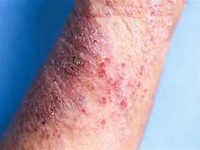
ECZEMA
FOODS THAT HARM
FOODS THAT HEAL
WHO’S AFFECTED
S
Eczema is an itchy, scaly rash often caused by sensitivity to foods, certain chemicals, or environmental conditions such as dryness
The rash is not always a true allergic reaction, but an immune system reaction to a normally harmless substance
Symptoms can appear anywhere from a few minutes to several hours after exposure to the offending food or substance
Eczema runs in families, often along with a tendency to develop asthma, hay fever, or hives
The most common type of eczema is atopic dermatitis; the term “atopic” refers to a personal and family tendency to develop eczema, asthma, or hay fever
Other types include contact dermatitis, which occurs after a substance damages the skin, and seborrheic eczema, which is better known as dandruff, or greasy, scaly patches on the skin or scalp
Nutrition Connection
While some foods may help alleviate eczema, some foods may trigger itNote these guidelines: Test for
Allergies
Common culprits include eggs, dairy products, seafood, walnuts, and pecans
Cow’s milk can cause eczema in babies and small children; goat’s milk or soy milk may be better tolerated
Many children outgrow their sensitivities by the age of six, but others have lifelong recurrences
Consume more antioxidants
Dryness may cause eczema by triggering the formation of free radicals and therefore may be countered by antioxidants such as beta-carotene
Brightly colored fruits and vegetables including apricots, squash, mangoes, carrots, pumpkin, and sweet potatoes are good choices
Eat foods rich in essential fatty acids
Foods like vegetable oils, fatty fish, and flaxseed may decrease swelling by helping to generate hormone-like substances called prostaglandins, which reduce inflammation
QUICK TIP:
Three cups of oolong tea may help relieve the symptoms of eczema
The polyphenols in the tea suppress allergic responses
Some researchers believe a diet rich in vitamin B6 protects against sensitivity rashes
Good sources include oily fish, meats, legumes, bananas, brown rice, wheat germ, and leafy green vegetables
Beyond the Diet
There are many potential causes of eczema that don’t pertain to foodHere are some general recommendations to avoid flare-ups: Avoid known triggers
If your rash becomes worse in either hot or very cold weather, avoid extremes of temperature
Buy soaps, detergents, and toilet papers that are free of dyes and perfumes
Evaluate external causes
Common offenders include nickel, which is often used for making costume jewelry; latex, which is used in household and industrial rubber gloves; woolen clothing; skin care products based on lanolin, the natural oil that is found in wool; and acrylic adhesives, used in applying acrylic nails or in sneakers
Importance of well balance diet




